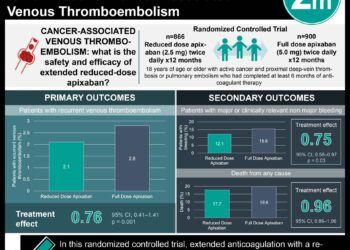New data on prevalence and spectrum of germline mutations in pediatric cancer patients
1. Significantly higher prevalence of germline mutations in cancer-predisposition syndrome genes identified in pediatric cancer patients compared with non-cancer adult patients.
2. New associations between germline mutations identified for TP53, PMS2 and RET and Ewing’s sarcoma and APC and SDHB mutations with neuroblastoma.
Evidence Rating: 2 (Good)
Study Rundown: The prevalence of germline mutations in cancer-associated or cancer-predisposition genes has not been thoroughly documented in the medical literature. Existing studies have relied primarily on candidate-gene approaches as opposed to next-generation sequencing. In this cross-sectional study, the researchers use whole-genome and whole-exome sequencing in pediatric cancer patients to analyze the prevalence and breadth of germline mutations in cancer-associated genes. The researchers notably found that 8.5% of the study participants had predisposing genetic mutations, primarily for genes associated with autosomal-dominant cancer syndromes. The researchers also found new mutations associated with Ewing’s sarcoma and neuroblastoma and through review of medical and family history, found that only half of the patients with pathogenic or probably pathogenic germline mutations had a family history consistent with their condition. Limitations of this study include the potential under-estimation of germline mutations, as pathogenic and probably pathogenic genes were selected based on a priori knowledge of the gene’s relevance to certain cancer syndromes. With regards to practice implications, this study has highlighted several new associations between germline mutations and cancers such as Ewing’s Sarcoma and neuroblastoma.
Click to read the study, published today in NEJM
Relevant Reading: ACGM recommendations for reporting of incidental findings in clinical exome and genome sequencing
In-Depth [cross-sectional study]: The prevalence of germline mutations in 1120 pediatric cancer patients (<20 years of age) were evaluated in this study. Either whole genome sequencing (n=595), whole exome sequencing (n=456) or both (n=69) were performed on participants. Specific analyses for single-nucleotide variants, small insertions and deletions and germline mosaicism were performed on 565 genes, 60 of which have been linked to autosomal dominant (AD) cancer syndromes and 29 of which have been linked to autosomal recessive (AR) cancer syndromes. The researchers also used two control groups: whole-exome sequencing of 966 unrelated adults (Genomes Project-GP) and a second data set of 515 persons with autism and 208 persons without autism. Genetic variants were coded as either pathogenic, probably pathogenic, of uncertain significant, probably benign or benign based on expert panel consensus. Of the 60 genes associated with AD cancer syndromes, 78 (12%) were identified as pathogenic and 17 (12%) were identified as probably pathogenic. The most common genes implicated in this analysis were TP54 (in 50), APC (in 6) and BRCA2 (in 6). The GP and autism control data sets had 1.1% and 0.6% pathogenic or probably pathogenic mutations of the 60 genes associated with AD cancer syndromes, respectively – both significantly lower result compared to the pediatric group. Of the AR cancer syndrome genes, only 1 patient had a pathogenic mutation. Across tumor types, pathogenic or probably pathogenic germline mutations were most commonly found in patients with non-CNS solid tumors (in 48/287, 16.7%) and CNS tumors (in 21/245, 8.6%). The researchers also found new correlations between germline mutations in TP53, PMS2 and RET in Ewing’s sarcoma patients and APC and SDHB mutations in neuroblastoma patients. Only half of the participants had a family history consistent with a known cancer-predisposition.
Image: PD
©2015 2 Minute Medicine, Inc. All rights reserved. No works may be reproduced without expressed written consent from 2 Minute Medicine, Inc. Inquire about licensing here. No article should be construed as medical advice and is not intended as such by the authors or by 2 Minute Medicine, Inc.





![[CORAL-1 trial] Interferon-free regimen for recurrent hepatitis C after liver transplant safe and effective](https://www.2minutemedicine.com/wp-content/uploads/2014/11/10229_lores-75x75.jpg)
![Adverse pregnancy outcomes associated with thrombophilias [Classics Series]](https://www.2minutemedicine.com/wp-content/uploads/2015/07/Classics-2-Minute-Medicine-e1436017941513-75x75.png)